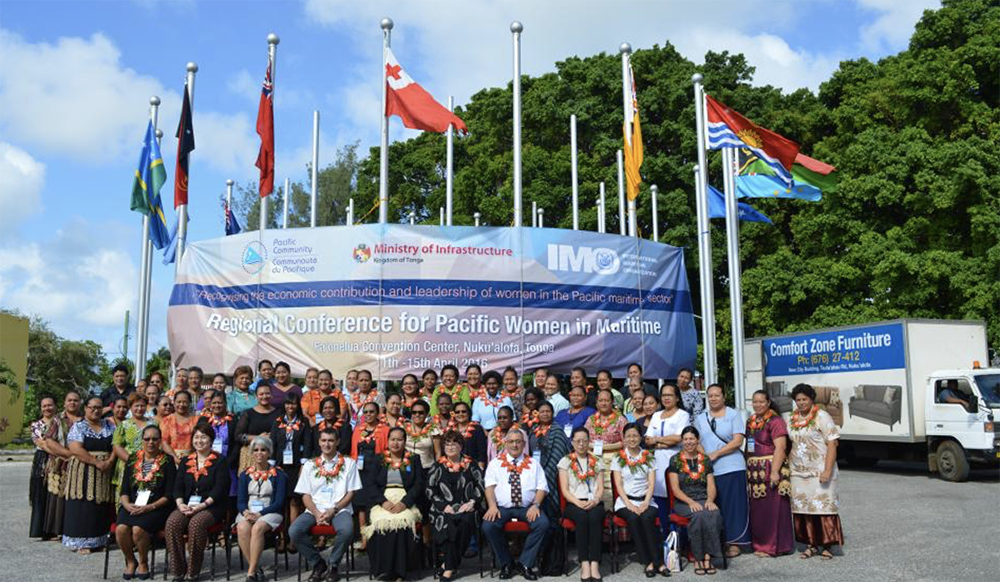Regional conference for Pacific women in the maritime sector (organised by SPC and IMO), April 2016
An increasing number of women are entering the maritime profession; however, their contribution is generally unrecognised and undervalued, and they continue to face barriers in accessing and participating in the sector. Addressing these gaps is a looming challenge for the Pacific Island region.
Women make up only 2 per cent of the worldwide supply of seafarers, and mainly work in the cruise and ferries sector, which are among the worst paid and least protected jobs at sea.
In April 2016 the Pacific Community (SPC), in collaboration with the International Maritime Organisation (IMO), organised a regional conference for Pacific women in the maritime sector. Attendees included women from the Pacific region who hold positions in maritime affairs, maritime education and training, protection of the marine environment, ports and fisheries, and non-governmental organisations, along with a few male counterparts from both the public and private sectors.
The conference resulted in the re-launch of the Pacific Women in Maritime Association (PacWIMA) in Nuku’alofa, Tonga – the only regional entity dedicated to supporting women in maritime.
‘This type of conference is long overdue in raising awareness of women’s roles in sustainable development’, said Chief Executive Officer of Tonga’s Ministry of Internal Affairs, Ana Bing Fonua.
‘Creating a community of experienced women in maritime occupations needs to take place at several levels, in the sector and its industries’, Ms Fonua added.
Since the meeting in Tonga, there has been an increase in support and momentum within the Pacific region. Papua New Guinea, which established a WIMA branch in 2007, was able to work with SPC and PacWIMA in supporting Fiji to launch FijiWIMA in September 2016. SPC has also worked with PacWIMA to assist the Cook Islands, Solomon Islands, Tonga and Vanuatu, who are all working on establishing national branches. SPC provided these countries with a template for the drafting of a WIMA constitution as well as a summary of lessons learned from FijiWIMA.
SPC and PacWIMA remain committed to increasing women’s participation in the maritime sector, and part of this work will include supporting the implementation of a regional strategy to ensure progress is made.
SPC is also working to improve women’s access to energy and lighting and business management skills through its Melanesian Million Miracle Project (M3P). In the community of Port Resolution, Vanuatu, M3P has improved access to energy and lighting through the provision of 100 solar pico lanterns that can be recharged through a community charging station.
SPC also provided support to assist the local women’s group to set up a sustainable business model for the proper management, operation and maintenance of the system.
SPC Monitoring and Evaluation Adviser, Allan Mua Illingworth said a total of 41 women were trained on simple bookkeeping and operation of the solar shops, which helped mobilise women around the topic of renewable energy.
‘The solar lights are very bright and can stay on for longer. It has been useful for families as women are able to utilise the lanterns for household activities like cooking and sewing, while children are able to use them for studies at night. The lights are well cared for by the women’s groups and are kept in the home’, said Mr Illingworth.
SPC is committed to supporting women’s access to and participation in the maritime and energy sectors, which supports Sustainable Development Goal 5 – Achieve gender equality and empower all women and girls.
